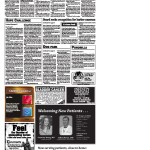ThisWeek CW 07/07/2011
Michael Pohorilla remembers the day following the 1941 attacks on Pearl Harbor as the most patriotic day in U.S. history during his lifetime.
“I was only 17 when Pearl Harbor happened. I was listening to the football game on the radio when the announcer came in,” Pohorilla recalled. “Monday morning, every city in America with a recruiting station had guys lined up around the block. Guys would sign up for the duration (of the war) plus an additional six months. That continued until 16.1 million U.S. soldiers were recruited — that was one in eight citizens. Literally the whole country was involved.”
The 87-year-old Canal Winchester resident was raised in northeastern Pennsylvania, where his parents settled after moving from what was at the time the Austro-Hungarian Empire. Pohorilla’s father fought in World War I as a U.S. infantryman and worked for years as a coal miner. When Pohorilla was 5, his father died after being exposed to a toxic gas attack in the war.
“Thanks to my father, I was able to fight on the right side of (WWII), same as he did in his time,” Pohorilla said. “When I turned 18, I enlisted in the U.S. Army as an aviation cadet. I wanted to be a pilot but flunked a 40-hour flight test, so they made me a navigator instead.”
He served in the U.S. Army Air Force, where he earned the rank of first lieutenant before his military stint ended.
Pohorilla said he flew 35 bombing missions out of southern England. On the 18th mission, his B-17, named the “Sky-Goddess,” was hit by German anti-aircraft flak as it flew over Merseberg (near Leipzig), where the crew had just dropped three tons of bombs on a chemical plant used to synthetically manufacture oil for the German war machine.
“You can fly a B-17 on two or three engines, but maintaining altitude and fuel consumption is a real problem,” he said. “I set coordinates for the straightest line back to Dover (England) I could, but we weren’t going to make it.
“The pilot had me instruct everyone to prepare to parachute out, but when the time came to jump, no one would go because we were too low to safely parachute out. By this point, we were over southern Belgium, which was liberated territory.
“I found us a nice, freshly plowed field and our pilot managed to do a gear-up belly landing; mud flew everywhere, but everyone survived it,” he said. “We left the ‘Sky-Goddess’ in that field and switched out with different planes for the rest of our missions.”
Looking at a map, Pohorilla traced the route through anti-aircraft fire that each mission took. For the bombers to survive through to their target and then return home, a normal mission had a formation of almost 1,000 aircraft, according to Pohorilla, which put 10,000 airmen in the sky at a time — the equivalent of one whole infantry battalion on the ground.
“Someone studied the numbers of the 8th Air Force and found that only about 8 percent of us were lucky enough to be a part of the Lucky Bastard Club,” Pohorilla said.
The club represents flight crew members who survived all 35 of their missions.
“We say God is our copilot. We only lost one member of our crew, a young kid who left behind a new bride at home,” he recalled. “Banes was a waist gunner who substituted on another flight when he was killed.”
Since the war, Pohorilla has retired from a very successful lifelong career in the chemical business, including the development of the first multi-graded motor oil. He and his wife, Ellen, were married for 55 years before she died around 2000. The couple had two children: Michael Jr., a Canal Winchester resident, and Thomas, who lives in suburban Philadelphia.
Pohorilla has remained engaged in the community as a life member and chairman of VFW Post 10523 and a volunteer and board member of Motts Military Museum in Groveport.

